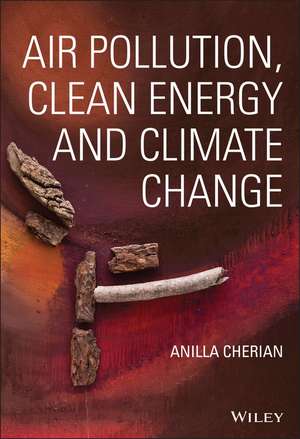Air Pollution, Clean Energy and Climate Change
Autor A Cherianen Limba Engleză Hardback – 27 apr 2022
Climate change is a globally recognized threat multiplier, but decades of intergovernmental negotiations have failed to curb toxic levels of fossil fuel energy-related air pollution which the World Health Organization (WHO) has identified as the world's largest, single environmental health risk. Lying in plain view are the troubling truths about the morbidity and ill-health burdens associated with anthropogenic climate change that are borne by those who have done the least to contribute to per capita emissions of greenhouse gas emissions. Ignoring the nexus between air pollution, lack of access to clean energy and climate adversities that extracts the harshest toll on those least resilient and most exposed to climate health risks represents a collective failure of the UN's ambitious, universally agreed upon 2030 Sustainable Development Agenda (SDA) which pledged "to leave no one behind".
This book highlights the air pollution crisis that emanates from the heavy reliance on polluting forms of energy used by the poor and also the urbanization of poverty in developing countries. It provides a framework for understanding why the broader sustainable development community needs to urgently address the more neglected intersection between adverse climatic impacts and energy-related air pollution which devastates the lives of the poorest and most vulnerable amongst us, especially young children, women and the elderly.
It focuses on the importance of breaking down persistent global silos on sustainable energy for all, and climate change reflected in the UN's 2030 SDA, and the 2015 Paris Agreement in order to more clearly integrate air pollution reduction and clean energy access partnerships. Integrating clean air and climate mitigation measures that specifically include curbing short lived climate pollutants such as black carbon via innovative partnerships/modalities are seen as vital to clean energy and climate responsive action. This book argues that linked action to reduce air pollution and increase clean energy access by non-nation state actors in the most populous cities in developing countries like India where annual average particulate matter pollution levels consistently exceeds WHO guidelines is essential to reducing health costs, disease burdens and climate risks impacting on millions of lives.
Air Pollution, Clean Energy and Climate Change will be of particular interest to climate change, clean air and clean energy and public health policy makers, academics, researchers, practitioners and civil society representatives who need to better understand the nexus between climate, air pollution, clean energy access and public health risks.
Preț: 622.72 lei
Preț vechi: 908.64 lei
-31% Nou
119.21€ • 122.60$ • 98.90£
Carte indisponibilă temporar
Specificații
ISBN-10: 1119771587
Pagini: 288
Dimensiuni: 172 x 251 x 20 mm
Greutate: 0.7 kg
Editura: Wiley
Locul publicării:Chichester, United Kingdom
Descriere
Climate change is a globally recognized threat multiplier, but decades of intergovernmental negotiations have failed to curb toxic levels of fossil fuel energy-related air pollution which the World Health Organization (WHO) has identified as the world's largest, single environmental health risk. Lying in plain view are the troubling truths about the morbidity and ill-health burdens associated with anthropogenic climate change that are borne by those who have done the least to contribute to per capita emissions of greenhouse gas emissions. Ignoring the nexus between air pollution, lack of access to clean energy and climate adversities that extracts the harshest toll on those least resilient and most exposed to climate health risks represents a collective failure of the UN's ambitious, universally agreed upon 2030 Sustainable Development Agenda (SDA) which pledged "to leave no one behind".
This book highlights the air pollution crisis that emanates from the heavy reliance on polluting forms of energy used by the poor and also the urbanization of poverty in developing countries. It provides a framework for understanding why the broader sustainable development community needs to urgently address the more neglected intersection between adverse climatic impacts and energy-related air pollution which devastates the lives of the poorest and most vulnerable amongst us, especially young children, women and the elderly.
It focuses on the importance of breaking down persistent global silos on sustainable energy for all, and climate change reflected in the UN's 2030 SDA, and the 2015 Paris Agreement in order to more clearly integrate air pollution reduction and clean energy access partnerships. Integrating clean air and climate mitigation measures that specifically include curbing short lived climate pollutants such as black carbon via innovative partnerships/modalities are seen as vital to clean energy and climate responsive action. This book argues that linked action to reduce air pollution and increase clean energy access by non-nation state actors in the most populous cities in developing countries like India where annual average particulate matter pollution levels consistently exceeds WHO guidelines is essential to reducing health costs, disease burdens and climate risks impacting on millions of lives.
Air Pollution, Clean Energy and Climate Change will be of particular interest to climate change, clean air and clean energy and public health policy makers, academics, researchers, practitioners and civil society representatives who need to better understand the nexus between climate, air pollution, clean energy access and public health risks.
